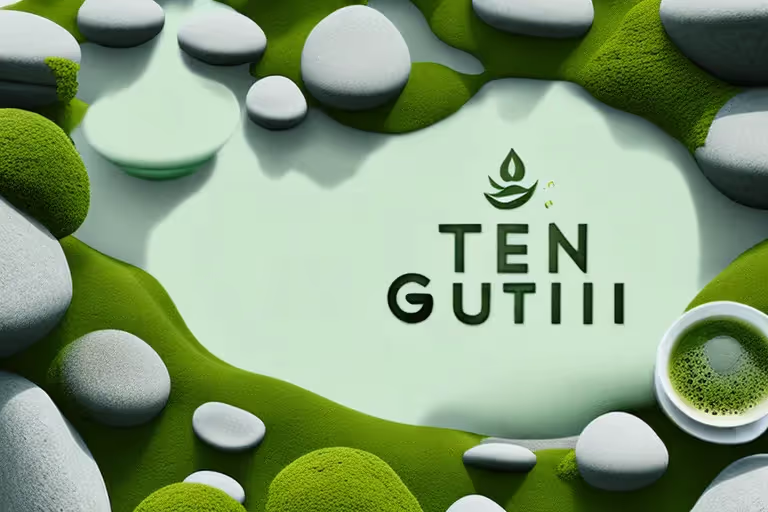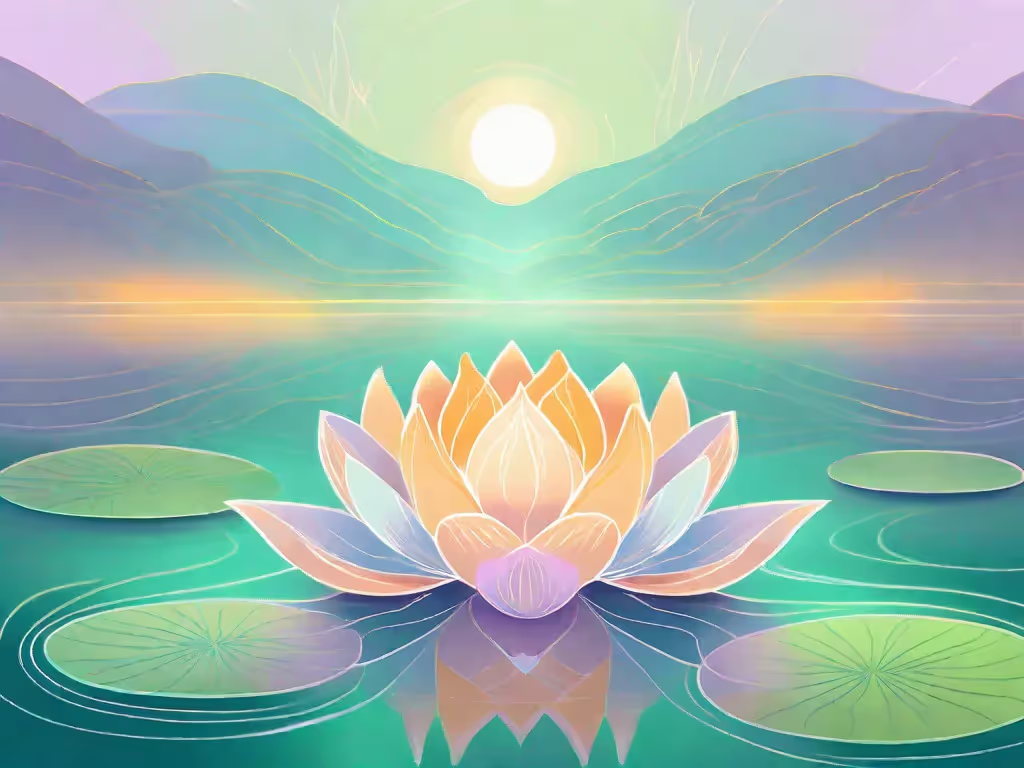When it comes to finding peace and achieving a state of inner harmony, much has been said about the powers of mindfulness and meditation. But what if a simple cup of tea could amplify these effects? That's where Matcha comes in, providing not just a boost in energy, but a relaxed focus that complements and enhances your practice of meditation.
Join us as we delve into the history and the science behind matcha, shedding light on its role as a potent catalyst for meditation.
Understanding Matcha: A Brief History
The story of matcha begins in Japan, where it has been an essential part of the country's culture for centuries. Originating around the 12th century, matcha was initially consumed by Buddhist monks who found it helpful in sustaining concentration during their long hours of meditation.
Matcha, derived from the Japanese words "ma" meaning powdered and "cha" meaning tea, is made from shade-grown tea leaves. The leaves are carefully handpicked, steamed, dried, and ground into a fine powder. This vibrant green powder is then whisked into hot water, creating a frothy and invigorating beverage.
But matcha is more than just a drink. It is a symbol of mindfulness, tranquility, and connection to nature. The process of preparing and consuming matcha was traditionally steeped in ritual and regarded as an act of meditation.
Matcha was traditionally prepared in a special ceremony, where its preparation and consumption were treated as an act of mindfulness and a moment of peace in the chaos of daily life. The ceremony, known as chanoyu or the "Way of Tea," involves meticulous attention to detail, from the selection of the tea utensils to the precise whisking technique.
Aura has the world’s largest and best collection of Meditations and hundreds of Coaches to choose from.
Try it Free!
The Origins of Matcha
The origins of matcha can be traced back to China, where tea cultivation first began. It was during the Tang Dynasty (618-907) that the Chinese started grinding tea leaves into a powdered form and whisking it into a frothy drink. This method of tea preparation eventually made its way to Japan, where it was embraced and refined by Zen Buddhist monks.
The Zen monks recognized the potential of matcha to enhance their meditation practice. Its unique combination of caffeine and an amino acid called L-theanine provided them with a calm alertness, allowing them to stay focused during long periods of meditation.
Matcha quickly became an integral part of Zen monastic life, and its consumption spread beyond the confines of the temples. The popularity of matcha grew among the samurai class and eventually reached the general population, becoming a beloved beverage enjoyed by people from all walks of life.
Matcha in Modern Times
In the current age, matcha has transcended cultural boundaries and found a home in the fast-paced, ever-evolving modern life. Celebrity endorsements and a rising global interest in healthy living have catapulted this humble green tea to a place of prominence in the realm of wellness and mindfulness.
Matcha is no longer limited to traditional tea ceremonies. It has evolved into a versatile ingredient used in various culinary creations, from lattes and smoothies to cakes and ice creams. The vibrant green color and earthy flavor of matcha have captured the imagination of chefs and food enthusiasts worldwide.
Ready-to-drink matcha products, cafes, and eateries have been popping up everywhere, offering people an easy way to integrate this ancient practice and calming antioxidant powerhouse into their daily routines. Matcha has become a symbol of self-care and a reminder to slow down and savor the present moment.
As the demand for matcha continues to grow, sustainable farming practices and fair trade initiatives have emerged to ensure the quality and ethical sourcing of matcha. This ensures that the ancient traditions and reverence for nature that are inherent in matcha production are preserved for generations to come.
The Science Behind Matcha
Matcha, a powdered green tea, has gained popularity not only for its distinct flavor and vibrant green color but also for its numerous health benefits. Let's delve deeper into the science behind matcha and explore its nutritional profile and potential health advantages.
Nutritional Profile of Matcha
Renowned for its unique taste, matcha is not only a delicious beverage but also a powerhouse of nutrients. It is rich in antioxidants called catechins, which are known for their cancer-fighting properties. These potent antioxidants help protect the body against free radicals, unstable molecules that can damage cells and contribute to the development of various diseases.
In addition to catechins, matcha also contains a good quantity of L-theanine, an amino acid known to enhance brain function, reduce anxiety, and improve mental clarity. L-theanine increases the production of alpha waves in the brain, which induces a state of relaxation without causing drowsiness. This amino acid is also responsible for matcha's ability to promote a sense of calmness and focus, making it a perfect partner to meditation.
Health Benefits of Matcha
The consumption of matcha has been linked to various health benefits. Research indicates that regular intake of matcha can contribute to overall cardiovascular health. The catechins in matcha have been found to help lower cholesterol levels and reduce the risk of heart disease.
Furthermore, matcha has been associated with weight loss due to its thermogenic properties. The high levels of catechins and caffeine in matcha have been shown to boost metabolism and increase fat oxidation, leading to enhanced calorie burning. Incorporating matcha into a balanced diet and exercise routine may aid in achieving weight loss goals.
Another significant advantage of matcha is its high levels of antioxidant activity. The catechins present in matcha help reduce inflammation in the body, protecting cells from damage and preventing chronic diseases. Antioxidants play a crucial role in neutralizing harmful free radicals and maintaining overall health and well-being.
Moreover, matcha has been found to have potential stress-reducing and mood-elevating effects. The combination of L-theanine and caffeine in matcha promotes a state of relaxation and alertness, enhancing cognitive performance and reducing stress levels. This holistic wellness package of matcha complements the mental clarity sought through meditation, creating a synergistic relationship that can have profound effects on your mental well-being.
In conclusion, matcha is not only a delicious and vibrant drink but also a nutritional powerhouse with a range of potential health benefits. Its rich antioxidant content, ability to support cardiovascular health, aid in weight loss, and promote mental well-being make it a valuable addition to a healthy lifestyle.
The Art of Meditation
Meditation is a practice that has been embraced by cultures around the world for centuries. It is a way to quiet the mind, find inner peace, and connect with a deeper sense of self. There are many different types of meditation, each with its own unique approach and benefits.
Different Types of Meditation
One popular form of meditation is mindfulness meditation. This practice involves focusing on your breath and observing your thoughts without judgment. By bringing your attention to the present moment, mindfulness meditation can help you develop a greater sense of awareness and acceptance.
Another type of meditation is transcendental meditation. This technique involves the repetition of a mantric phrase, which helps to quiet the mind and transcend ordinary thinking. Transcendental meditation is known for its ability to promote deep relaxation and a sense of inner peace.
Regardless of the style you choose, the ultimate goal of meditation is to achieve a mindset of calm and focused awareness. It is a journey that requires dedication and practice, but the rewards are well worth the effort.
The Benefits of Regular Meditation
The benefits of regular meditation are numerous and far-reaching. One of the most notable benefits is a reduction in stress and anxiety. By taking time to quiet the mind and focus on the present moment, meditation can help you let go of worries and find a sense of calm.
In addition to stress reduction, regular meditation can also improve focus and concentration. By training the mind to stay present and let go of distractions, meditation can enhance your ability to stay focused on tasks and achieve greater productivity.
Furthermore, meditation has been shown to have a positive impact on emotional health. It can help you develop greater self-awareness, cultivate compassion, and improve your overall sense of well-being. With regular practice, meditation can become a powerful tool for managing emotions and finding balance in life.
But how can matcha enhance your meditation practice? Matcha, a finely ground powder made from green tea leaves, has been used for centuries in Japanese tea ceremonies. It is known for its vibrant green color, earthy flavor, and numerous health benefits.
When incorporated into meditation, matcha can intensify the experience in several ways. Firstly, matcha contains a unique amino acid called L-theanine, which has been shown to promote relaxation and reduce stress. This can help create a more peaceful and focused state of mind during meditation.
Secondly, the act of preparing and drinking matcha can add a ritualistic element to your meditation practice. The process of whisking the matcha powder with hot water, sipping it slowly, and savoring its taste can help create a sense of mindfulness and presence.
Finally, matcha contains antioxidants that can support overall health and well-being. These antioxidants help to protect the body from free radicals and promote a healthy immune system. By incorporating matcha into your meditation practice, you are not only nourishing your mind but also supporting your physical health.
In conclusion, meditation is a powerful practice that can bring numerous benefits to your life. By exploring different types of meditation and incorporating matcha into your practice, you can enhance the experience and deepen your connection with yourself. So, take a moment to quiet your mind, find a comfortable seat, and embark on a journey of self-discovery through the art of meditation.
Combining Matcha and Meditation
The Ritual of Matcha Meditation
The ritual of matcha meditation involves preparing and savoring a cup of matcha tea before your meditation session. This process lets you slow down, prepare your mind for the session ahead, and adds a physical dimension to the mental exercise of meditation.
An element of mindful relaxation seeps into the preparation of this brilliant green beverage—the moment of quiet anticipation, the whisking of the powder into a frothy brew, the warm cup in your hands, and finally, the first sip. All these aspects culminate into an experience that's grounding and enriching.
How to Incorporate Matcha into Your Meditation Routine
Begin by sourcing high-quality matcha powder, a bamboo whisk, a tea bowl, and a measuring spoon. Start your meditation routine by warming the tea bowl, adding the matcha powder, and carefully whisking in hot (not boiling) water until a frothy consistency is achieved.
Once the matcha tea is prepared, take a moment to appreciate the vibrant color and soothing aroma before enjoying your first sip. Drinking matcha tea can help to focus your mind and initiate relaxation, setting you up for a productive meditation session.
Personal Experiences with Matcha Meditation
Case Studies and Personal Stories
Across the globe, thousands of individuals have found solace in this unique marriage of matcha and meditation. Many have felt an increased sense of calm and focus, improved qualities of sleep, and a better understanding of their own thoughts and emotions. Their stories are a testament to the transformative power of matcha meditation.
Expert Opinions on Matcha Meditation
Health and wellness experts around the world are endorsing the matcha meditation practice. They believe that the calming properties of matcha, coupled with the benefits of mindful meditation, contribute to an enhanced state of wellbeing.
Renowned psychologists, nutritionists, and even spiritual leaders consider incorporating matcha into the meditation process to be a dynamic and holistic approach to fostering mental wellness.
Finally, if you're interested in integrating matcha meditation into your lifestyle, consider using the Aura Health app. It's a fantastic resource for guided meditations, sleep stories, life coaching, and a supportive community. As you embark on your matcha meditation journey, this helpful app can serve as a beacon, guiding you on the path to tranquility and well-being.
Aura is Your All In One App for Meditation, Mindfulness Wellbeing
Find peace every day with one app for your whole well-being. There is no one-size-fits-all solution to mental well-being. Aura is the first all-in-one wellness app that learns how to best help you. Discover an endless library of expert-created tracks for your well-being, all taught by the world’s best coaches, therapists, and storytellers. With Aura's personalized recommendations, you can find peace every morning, day and night.



.webp)






.avif)

%20(1).avif)


.avif)
.avif)
.webp)


.avif)


















































































































.avif)

















.svg)









